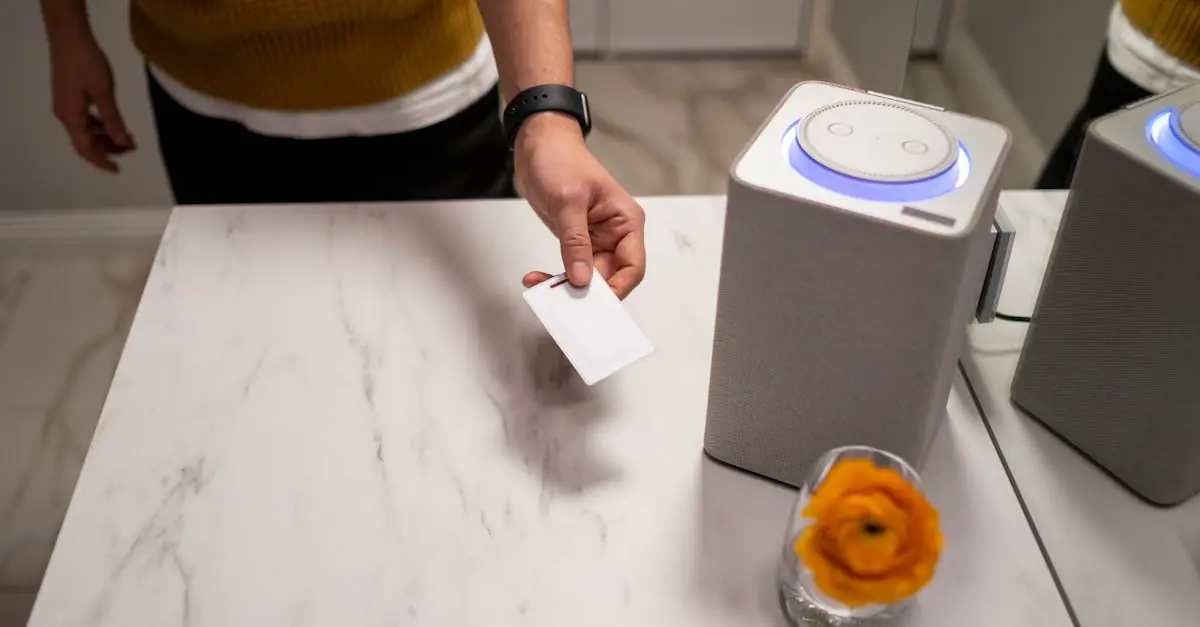Table of Contents
ToggleImagine waking up to the sound of your voice assistant cheerfully reminding you that it’s time to rise and shine—without even having to lift a finger. Smart home voice assistants have transformed the way people interact with their homes, turning mundane tasks into effortless commands. From dimming the lights to brewing that perfect cup of coffee, these digital companions are like having a personal butler who never judges your choice of pajamas.
As technology advances, voice assistants are becoming increasingly intuitive, understanding not just commands but also context and preferences. They’re not just gadgets; they’re your home’s new best friends, ready to help you navigate daily chaos with a dash of humor and a sprinkle of efficiency. Dive into the world of smart home voice assistants and discover how they can make life not just easier, but a lot more fun.
Overview of Smart Home Voice Assistants
Smart home voice assistants significantly enhance daily life by providing seamless control over various devices. They simplify complex home automation tasks, making interactions intuitive. Understanding natural language, these assistants respond accurately to commands like adjusting the thermostat or switching on lights.
Devices such as Amazon Echo and Google Nest are popular examples that showcase their versatility. Users engage with these devices for tasks ranging from setting timers to controlling entertainment systems. Enhanced capabilities allow for context awareness, further personalizing the user experience.
AI algorithms in voice assistants learn user preferences over time. Learning this information, they predict needs and respond proactively. For example, a voice assistant might adjust lighting based on the time of day or suggest morning routines based on previous habits.
Integration with smart home devices extends their functionality. Users can manage security systems, thermostats, and appliances through simple voice prompts. Through this integration, overall home automation becomes cohesive and user-friendly.
Adoption rates for these technologies continue to rise, driven by consumer demand for convenience. Recent data shows that over 40% of households use voice assistants for daily tasks. The popularity of these devices also stems from their ability to add a touch of humor and personality to interactions.
Voice assistants not only streamline routines but also enhance lifestyle enjoyment. Given their capacity to manage multiple devices effortlessly, they serve as central hubs for modern smart homes. By embracing smart home voice assistants, users can truly transform their living spaces into efficient and delightful environments.
Popular Smart Home Voice Assistants
Smart home voice assistants have become integral to modern living. They enhance user experiences by simplifying everyday tasks.
Amazon Alexa
Amazon Alexa dominates the voice assistant market. This versatile platform integrates seamlessly with various smart home devices. Users can control lights, adjust thermostats, and set alarms through simple voice commands. Over 100,000 compatible devices exist, illustrating its expansive ecosystem. Alexa adapts to user preferences over time, providing a personalized touch to interactions. With features like routines, users can execute multiple tasks with a single command, streamlining daily life.
Google Assistant
Google Assistant offers robust features and superior context awareness. This voice assistant delivers accurate answers by leveraging Google’s vast search capabilities. Voice commands allow users to manage tasks, check schedules, and play music effortlessly. Integration with third-party services expands its functionality, supporting over 50,000 smart devices. Proactive suggestions enhance convenience by anticipating user needs based on habits, making it a popular choice for tech-savvy households.
Apple Siri
Apple Siri continues transforming how users interact with their devices. This voice assistant excels in integrating with Apple’s ecosystem, allowing users to control HomeKit-enabled products easily. Users can ask Siri for quick information, send messages, or make calls hands-free. Privacy prioritization stands out as Siri processes tasks without compromising user data. Though often associated with iOS devices, Siri’s capabilities extend to Mac and Apple Watch, providing a consistent experience across platforms.
Features and Capabilities
Smart home voice assistants offer a range of features and capabilities, greatly enhancing their utility in daily life.
Voice Recognition Technology
Voice recognition technology plays a critical role in smart home voice assistants. This technology allows devices to accurately understand and process spoken commands. Using advanced natural language processing, these assistants interpret context, ensuring effective communication. They learn from user interactions, improving accuracy over time. Enhanced voice recognition models support multiple accents and dialects, making these devices accessible to diverse populations. Data suggests that improved recognition capabilities contribute to higher user satisfaction.
Smart Home Integration
Smart home integration represents a fundamental advantage of voice assistants. These devices seamlessly connect with various smart home products, serving as centralized control points. They manage lighting, thermostats, and security systems, simplifying the user experience. With compatibility for thousands of devices, voice assistants facilitate effortless automation. Users can create personalized routines that enhance daily living. Integration spans across major ecosystems like Amazon Alexa, Google Assistant, and Apple Siri. This capability transforms homes into automated environments that respond intuitively to user preferences.
User Experience and Benefits
Smart home voice assistants redefine daily living by enhancing user interaction and streamlining tasks. These devices position themselves as crucial tools that facilitate convenience, personalization, and overall wellbeing in the home environment.
Convenience and Accessibility
Convenience emerges as a primary benefit of smart home voice assistants. Routine tasks like adjusting lighting or playing music become effortless with simple voice commands. Accessibility improves for users with mobility challenges, enabling them to control their environment without physical exertion. Over 40% of households utilize voice assistants for everyday tasks, highlighting their burgeoning role in daily life. Voice recognition technology ensures accurate command interpretation, accommodating varying accents. Centralized control over various smart devices leads to seamless operation.
Personalization and Adaptability
Personalization transforms user experiences with smart home voice assistants. These devices learn preferences over time, adapting to individual habits and routines. Unique routines and settings cater to user needs, whether it’s waking up to a preferred playlist or dimming lights at bedtime. The integration of AI algorithms empowers proactive assistance, anticipating requirements throughout the day. Its adaptability shines as the assistant fine-tunes responses based on user interactions, ensuring relevance and efficiency. The capacity to adjust to evolving lifestyle changes fosters a harmonious relationship between the device and the user.
Challenges and Limitations
Smart home voice assistants face notable challenges and limitations that can impact user experience.
Privacy Concerns
Privacy concerns arise as these devices constantly listen for voice commands, leading to apprehension regarding data security. Users worry about how their personal data is collected, stored, and shared with third parties. According to recent studies, 60% of consumers express unease about potential unauthorized access to their voice recordings. Companies like Amazon and Google implement privacy controls, allowing users to delete voice history, yet skepticism remains prevalent. Users often seek assurance that their data is protected while enjoying the convenience these devices offer.
Compatibility Issues
Compatibility issues can hinder the effectiveness of smart home voice assistants. Users encounter challenges when integrating devices from various manufacturers due to differing protocols. Studies show that over 25% of smart home devices lack compatibility with major voice assistants like Amazon Alexa or Google Assistant. Inconsistent support for specific devices can lead to fragmented experiences. For instance, not all smart lights respond to voice commands, limiting user functionality. Investing time in confirming device compatibility becomes essential for creating a seamless smart home ecosystem.
Smart home voice assistants are revolutionizing the way people interact with their living spaces. By simplifying everyday tasks and enhancing user experiences, these devices have become essential tools for modern households. Their ability to learn preferences and adapt to individual needs makes them invaluable companions in daily life.
While the benefits are clear, challenges such as privacy concerns and compatibility issues remain significant. As technology continues to evolve, addressing these challenges will be crucial for wider adoption. Embracing smart home voice assistants can lead to a more efficient and enjoyable home environment, making everyday routines smoother and more intuitive.







